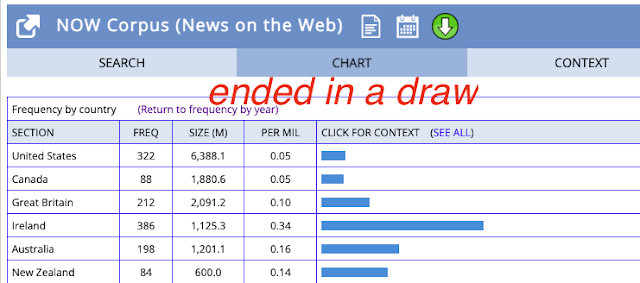So much of the "news" this year was about female popular music stars. The year started with Beyonce going country, then Charlie XCX declared a brat summer (leading Collins dictionaries to declare brat their Word of the Year). Facebook keeps feeding me videos of Ariana Grande acting and interviewing, and an incredible number of my middle-aged (and beyond) friends went to see Taylor Swift. Album-of-the-year lists are filled with female solo artist megastars.
It is Ms Swift who gives us our UK-to-US Word of the Year:
fortnight
This is the title of the single she released in April, co-written by Jack Antonoff and featuring Post Malone. It has been nominated for Record of the Year in the 2025 Grammy Awards. Thank you to Helen Zaltzman for nominating the word!painfully losing to Bill Belichick and Brady over the past fortnight. [nfl.com, 21 Dec 2021]
Since their [Korean band BTS's] fortnight in L.A., which turned out to be a mere reprieve for artists and fans [Hollywood Reporter, 29 Dec 2021]
...as NYC is currently recording 3,761 daily Covid infections, a 55% increase in a fortnight [deadline.com, 10 Dec 2022]
By 2023, far more of the American fortnights seem to be homegrown. Many of those are about sport(s) and many of those are about European football (AmE: soccer). But a good few (like the nfl.com one above) are about US sports. It's possible that the sports pages, "a NOOBs hotbed" are the entry point for the current fortnight trend.
One could think that the sports connection is what made Swift aware of the term—but I think it's a word that poetically minded and well-travel(l)ed Americans would often know. So I'm not going to bet that the inspiration for the word use was Swift's involvement with an NFL player.
The song ends with some American geographical detail:
Thought of callin' ya, but you won't pick up'Nother fortnight lost in AmericaMove to Florida, buy the car you wantBut it won't start up till you touch, touch, touch me
It feels like the juxtaposition of fortnight and America is a nod to the unAmericanness of fortnight.
Linguistic Americanness/Britishness depends on how you define Americanism and Britishism. This one is British because it died out in the US, not because it was never used there. Its new American fame is a tiny drop compared to its early-US use:
Note that fortnight been going down-down-down in the UK too. British people are saying two weeks more than fortnight since around the 1970s:
Some people call that Americani{s/z}ation. I'm not so sure. It's not like two weeks is a phrase an English speaker would have to learn from Americans. It wasn't Americani{s/z}ation when English speakers stopped saying sennight (='seven nights', like fortnight = 'fourteen nights') in the 17th century in favo(u)r of one week or a week. It's just using another, more transparent expression that your language allows, and allowing the more old-fashioned-feeling one to fall away.
-----------------
At this point, I am not certain there will be a US-to-UK Word of the Year 2024. If you're reading this before I post one, you're still welcome to nominate!


























